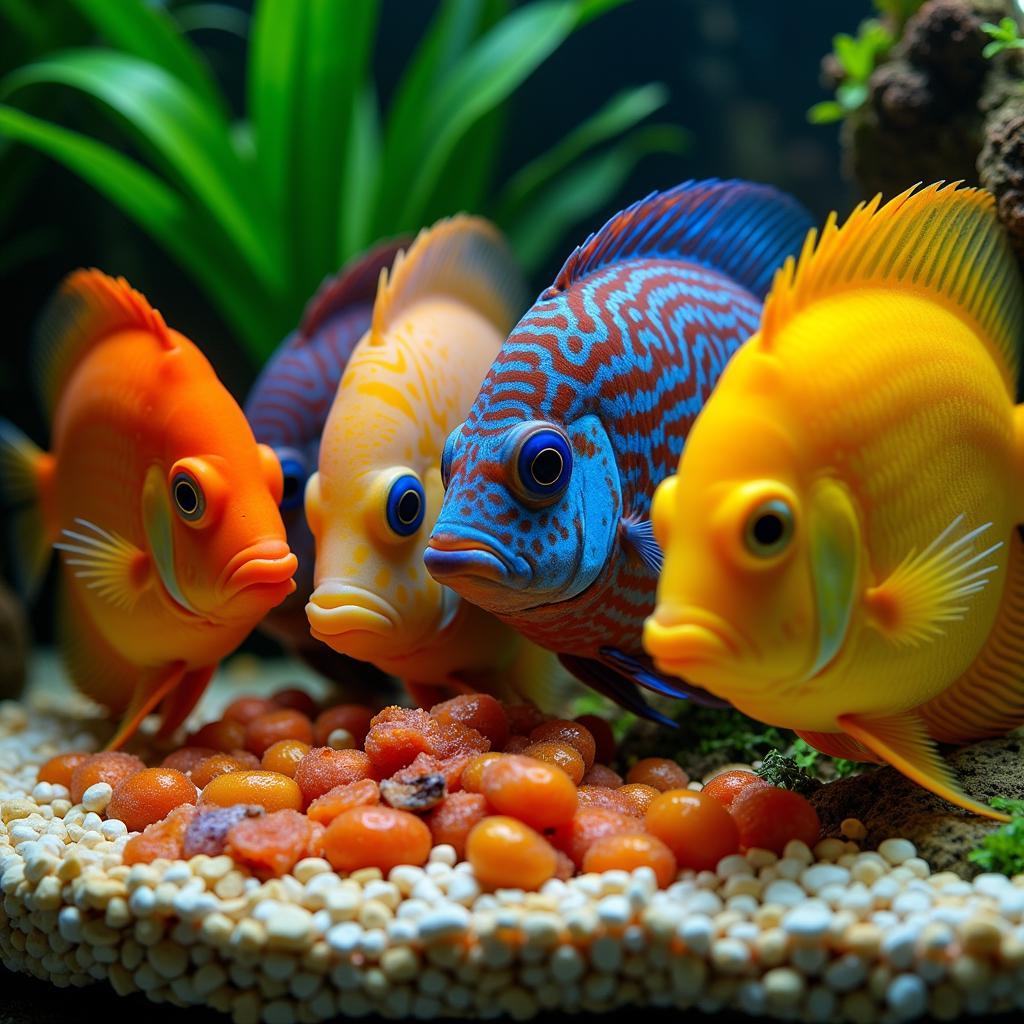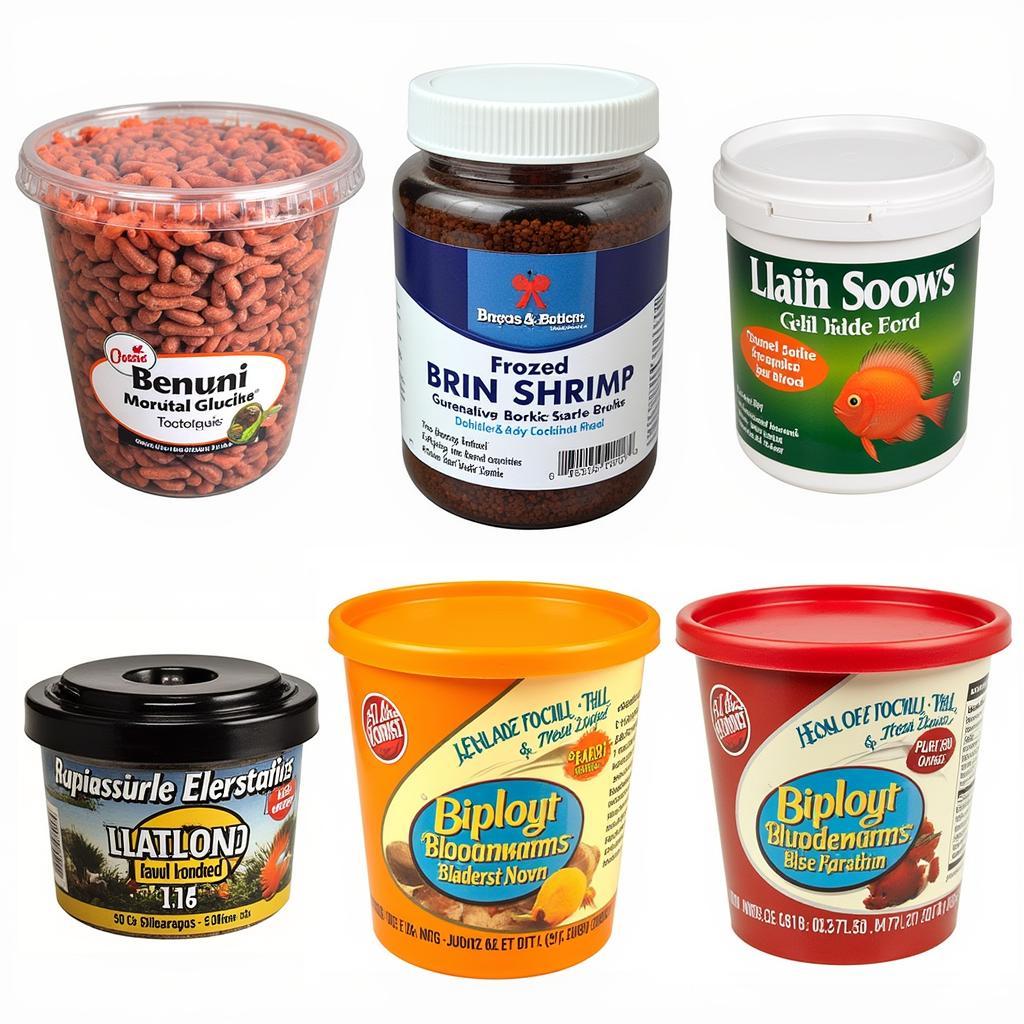Discus Food is a crucial aspect of keeping your discus fish healthy, vibrant, and thriving. Understanding what, how, and how often to feed your discus can be the difference between a lackluster aquarium and one that bursts with color and life. In this comprehensive guide, we’ll delve into the fascinating world of discus food, exploring everything from their natural diet to the best commercially available options.
Why Discus Food Matters
 Discus fish enjoying a varied diet
Discus fish enjoying a varied diet
Unlike many other popular aquarium fish, discus are native to the nutrient-rich, complex ecosystems of the Amazon Basin. Their wild diet consists of a fascinating variety of insects, larvae, small crustaceans, and even plant matter. Replicating this diverse diet in captivity is essential for their overall health and well-being.
The Building Blocks of a Healthy Discus Diet
To create a feeding regimen that mimics their natural feeding habits, focus on providing a variety of foods that cover these key nutritional categories:
- Protein: The cornerstone of a discus fish’s diet. Look for high-quality protein sources like bloodworms, brine shrimp, black soldier fly larvae, and krill.
- Fats: Essential for energy and supporting cell function. Offer foods rich in healthy fats like daphnia, mosquito larvae, and high-quality flake or pellet food.
- Fiber: Often overlooked but crucial for digestive health. Include small amounts of spirulina, blanched spinach, or other discus-safe vegetables in their diet.
- Vitamins & Minerals: Support a robust immune system and overall health. Look for commercially prepared discus food fortified with essential vitamins and minerals.
Types of Discus Food
 Variety of discus fish food options
Variety of discus fish food options
Thankfully, today’s discus keepers have a wide array of food options to choose from:
1. Live Foods:
- Bloodworms: A highly palatable and nutritious treat that should be fed in moderation due to potential parasite risks.
- Brine Shrimp: An excellent source of protein and fatty acids. Easily hatched at home or purchased frozen.
- Black Soldier Fly Larvae: A sustainable and highly nutritious food source packed with protein and calcium.
- Daphnia: Tiny crustaceans rich in protein and healthy fats. Can be cultured at home or purchased live or frozen.
2. Frozen Foods:
- Brine Shrimp: A convenient and safe alternative to live brine shrimp.
- Bloodworms: Reduces the risk of parasites compared to live bloodworms.
- Mysis Shrimp: Rich in protein and carotenoids, which enhance discus coloration.
- Krill: Another excellent source of protein, fatty acids, and astaxanthin for vibrant colors.
3. Prepared Foods:
- Flake Food: A staple in many discus diets. Look for high-quality flakes specifically formulated for discus.
- Pellets: Similar to flake food but often more nutrient-dense and less likely to cloud the water.
- Gel Food: A popular choice that allows you to customize your discus’ diet by adding ingredients like blended vegetables or meaty proteins.
Feeding Frequency and Quantity
How often and how much you feed your discus depends on several factors, including their age, activity level, and the type of food you’re offering:
- Young Discus (Fry): Require frequent feedings, up to 5-6 times per day, with small, easily digestible foods like baby brine shrimp and crushed flake food.
- Juvenile Discus: Feed 3-4 times daily with a mix of live, frozen, and prepared foods.
- Adult Discus: Feed 1-2 times per day with a varied diet.
Offer only as much food as your discus will consume within a few minutes to avoid overfeeding and water quality issues.
Tips for Success
- Quarantine Live Foods: To prevent the introduction of parasites, always quarantine live foods for at least two weeks before feeding them to your discus.
- Soak Prepared Foods: Soften flake or pellet food in a bit of tank water before feeding to make it easier for your discus to digest.
- Variety is Key: Rotate between different food types to provide a balanced nutritional profile and keep your discus interested in their meals.
- Observe Your Fish: Monitor your discus closely for signs of overfeeding or nutritional deficiencies.
Conclusion
Providing a varied and nutritious diet is fundamental to the well-being of your discus fish. By understanding their dietary needs and exploring the wide range of food options available, you can help your discus thrive in a captive environment. Remember, a well-fed discus is a healthy and vibrant discus.
FAQs
1. Can I feed my discus only flake food?
While high-quality flake food can provide a good nutritional base, it’s best to offer a variety of foods, including live, frozen, and other prepared options.
2. How can I tell if I’m overfeeding my discus?
Signs of overfeeding include cloudy water, excessive waste buildup, and lethargy in your fish.
3. Where can I buy high-quality discus food?
Reputable local fish stores and online retailers specializing in discus supplies are good places to find quality food options.
4. Can I culture my own live food?
Yes, culturing live foods like brine shrimp and daphnia at home is a cost-effective way to provide your discus with a nutritious food source.
5. My discus is a picky eater. What should I do?
Try offering a variety of foods to find what your discus prefers. Soaking prepared foods or adding a garlic additive can also make them more appealing.
You Might Also Be Interested In:
- Setting Up the Perfect Discus Aquarium
- Common Discus Diseases and How to Prevent Them
- Breeding Discus: A Beginner’s Guide
Need Help?
Have questions about discus food or need help with your aquarium? Contact us at Phone Number: 02437655121, Email: minacones@gmail.com, or visit us at 3PGH+8R9, ĐT70A, thôn Trung, Bắc Từ Liêm, Hà Nội, Việt Nam. We have a 24/7 customer support team ready to assist you.